
 |
| Home | Events | Membership | Activities | Bush Camps | Eco Schools | Species | Gallery | Art Fair | Supporters | Contact Us |
| Mukuvisi Woodlands is OPEN from 8 am to 5pm EVERY DAY: Keep watching our EVENTS page for upcoming events |
| Mukuvisi Woodlands Eco Schools Programme Events to 2021
Enjoy coverage and photos of some of our previous Eco Schools Events on this page |
| World Environment Day Eco Schools Event Mukuvisi 9 June 2017 |
 |
 |
 |
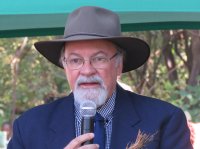 |
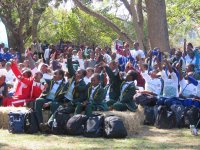 |
 |
 |
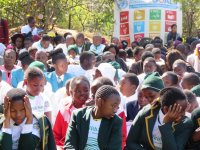 |
 |
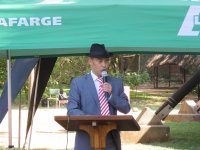 |
Mukuvisi Woodlands hosted an excellent World Environment Day celebratory event as part of the Eco Schools Programme on 9 June 2017. It was extremely well attended by several hundred school children and scores of teachers and dignitaries. The children performed songs, dances and poems around the environmental theme and there were many interesting stands for everyone to visit where they learn more about energy saving projects and various environmental issues. Competitions were held and prizes awarded at the end of the event which ran from 9 am to 1.30 pm. |
||||
| World Wetlands Day Celebrations at Mukuvisi Woodlands 10 Feb 2017 | ||||
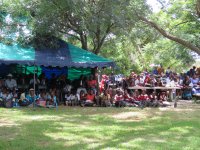 |
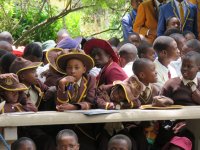 |
 |
 |
 |
 |
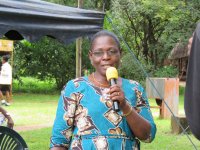 |
 |
 |
 |
| Over 700 school children, teachers, college and university students, lecturers, government and government agency officials and VIPs, Mukuvisi Woodlands Councillors and staff, and many other interested parties, gathered at Mukuvisi Woodlands on 10 February to celebrate World Wetlands Day and raise awareness of the critical, urgent need to conserve these from any further damage in our city. It was a very festive and successful occasion! The children went on tours in the Woodlands to see the wetlands contained within it – at this time extremely waterlogged and well demonstrating their description.
Many of the attending children also recited poems, read essays, sang songs and performed plays, about the importance of conserving our precious wetlands, which provide so many useful services to us, free of charge. Their recitations and performances were both delightful and passionate, as well as very informative, demonstrating their in-depth knowledge of the many reasons why wetland conservation is so vitally important. The best performances were awarded prizes. Guest of honour was the Minister for Provincial Affairs, Harare, the Honourable Mrs Mirriam Chikukwa, who gave a speech about the extremely urgent need to protect our wetlands citywide, and prevent any further destruction to them, currently being perpetrated by construction, dumping and cultivation. She strongly urged all the relevant Authorities with the power to prevent illegal development on wetlands to ensure that the law in this regard was adhered to, and enforced. Well-known wetlands expert Professor Chris Magadza also gave a very informative speech, which included some excellent illustrations of their quantifiable financial value to us, the residents of Harare, and how much money they save us all – as long as they are left intact! |
||||
| What may be defined as a WETLAND?
The description WETLAND encompasses vleis, marshes, estuaries, river catchment areas, flood plains, swamps, dambos and sponges – in fact ANY area which is either permanently or seasonally water-logged. Most wetlands globally are under threat of destruction through human activity. A quick drive through the suburbs of the city of Harare will soon show you what is going on in our many vlei areas. These open green spaces which are seasonally waterlogged, have been protected from building development, dumping and crop cultivation by law, ever since Harare began to be planned and built, turning gradually into the sprawling city we know today. The value of these green spaces was early recognised. It is and always has been deemed by town and city planners the world over, absolutely essential to leave some green belts in any city un-developed and in their natural state, for the enjoyment of residents, and to break up what is otherwise a ‘concrete jungle’ devoid of attractive plants and trees. Even more importantly, water supply for the residents is a fundamental when planning any town or city. The vital role of Harare’s wetlands that can be found dotted about all over our suburbs, was fully understood by our early town planners. Harare was developed right at the top of the watershed. Some towns and cities rely on run-off from land higher up, into the rivers, dams and reservoirs that in turn supply their residents. Not so Harare, which was built right by and around the rivers and tributaries supplying its water, and at the highest point in its area and its environs. This fact appears still to be lost on so many people who live in Harare, which is why they do not seem to place value on the vleis throughout our city, and just see real estate – and dollars and cents - when they look at these important green spaces. Because without them – our water will dry up and run out! These are our starting point for our water supply. These vleis - otherwise known as wetlands - store and purify our water for us. They act as sponges, soaking up vast amounts of water in the rains, then releasing it gradually into the rivers which supply our dams and down the line, the water we drink and use. They thus also prevent flooding. In addition, as this water is naturally released from the vlei over time into the water supply, so it is filtered and purified – at no cost at all. These huge natural sponges can thus be recognised as a vital link in the chain of complex, intricate, highly efficient natural hydration processes and systems upon which all living species, ourselves included, rely. These vleis were once upon a time left well alone by would-be developers, both because the law was enforced and because these areas were recognised as highly unsuitable for construction in any case, given their seasonally water-logged nature. Cultivation and dumping on them was also tightly controlled, because the useful, valuable functions they were serving, as attractive open green areas, vital water reservoirs and filters, and in flood mitigation, was recognised, honoured and gratefully acknowledged. Huge tarred roads are going in on our many of our wetlands too, put there by would-be developers, breaking them up into segments, damaging them, removing the wonderful rich, dark, absorbent vlei soil, and rendering them useless to absorb water in their natural way since time immemorial. If you wonder why our roads are so often flooded and awash in heavy rain – this rampant vlei destruction in its many forms, is the reason! In addition, these wetlands are home to many unusual species of flora and fauna, the continuing existence of all of which are under severe threat from these many human incursions and activities. All destructive human interferences with our city’s precious wetlands, critical to the survival of our city and of we who live here, if allowed to continue, will cause these wetlands to dry up completely. That day is drawing close - we are not talking decades away any more! And if they do dry up, the implications for Harare as a city, for on-going ecological integrity, and for species survival and biodiversity, are vast. So if you think those crying out for wetland conservation are just a bunch of ‘greenies’ who only care about wildlife - think again! In the final analysis – YOU are affected -personally. You drink water, don’t you? Can you live without it? This is not a problem for someone ‘out there’ to fix. It belongs to all of us! Article by Rosie Mitchell |
| The 2016 Eco Schools Challenge Competitions and Awards Ceremony 21 October 2016 |
| Starting at 9 am and ending at 3pm, several hundred school children, students, teachers, VIPs and others descended on Mukuvisi Woodlands on 21 October for the annual Eco Schools Challenge and Awards event, with the theme for this year “My Environment, My Future, My Responsibility”. The theme covers all our natural resources and areas being implemented by Eco Schools member clubs, who seek to improve people’s lives, whilst also ensuring national environmental sustainability, and caring for the Earth. |

The exhibition was held in the open under trees at the Boma next to the Education Centre at Mukuvisi Woodlands. The Enviro Challenge competition was again sponsored by the Delegation of the European Union to Zimbabwe and the French Embassy in Zimbabwe sponsored some of the prize categories. Schools countrywide participate in the various categories of the competition. The Enviro Challenge Competition is held annually as a tool for evaluating environmental stewardship and environmental awareness among primary and secondary schools involved in The Enviro Challenge Programme in Zimbabwe, which is run by the Mukuvisi Woodlands Environmental Education Centre in collaboration with the Ministry of Primary and Secondary Education. The thematic areas covered by the competition include; Climate Change adaptations and mitigation, Waste Management, Resource Use (Water, Soil, Energy), Nature and Biodiversity, and Global and Local Issues. This year’s event was held against the backdrop of the UNFCCC COP 21 Paris agreement and as a follow up to Walk-to-Paris Zimbabwe Cop 21 campaign which was launched last year by the French Embassy in Harare and the EU in collaboration with UNICEF and Eco-Schools. The 2016 Edition of the Eco-Challenge also reflected on the Clean Energy Workshops for School Clubs Leaders which were supported by UNICEF as part of the Eco-Schools capacity building projects that were conducted in three provinces of Zimbabwe. |

|
|
|---|---|---|
| The event gave participating schools the opportunity to showcase their talent and their contribution to education for sustainable development in our country through conservation and protection of the environment. Schools competed in the following Categories: | ||
| 1. Primary Schools
Art drawing contest. Express yourself in drawing. CATEGORY A: Drawing: Primary School Level Primary Schools to do a drawing where they express their understanding of: 1.1 Climate Change: The effects of climate change. 1.2 Wetland Life: 1.3 Forest Life: 1.4 Waste Management: 1.5 Birds of Prey: Impression of threats to birds of prey. 2. Secondary Schools To do a Model Design for exhibit that tells a story, where they express their impression of: CATEGORY B: Model Designs: Secondary School Level 2.1 Climate Change: A model Design depicting effects of Climate. 2.2 CAMPFIRE Village: A Model Design depicting Campfire Village, close to Wildlife Area. 2.3 Land Degradation: Model Design of any form of land degradation. 2.4 Recycling: A model showing recycling activity or products. 2.5 Energy: Model Design showing sources of Renewable Energy and Non-Renewable Energy. |
3. Survival Skills
CATEGORY C: Primary and Secondary Level 3.2 Song and Dance. 3.3 Quiz: Compulsory. 3.4 Drama and Poetry. There were exhibitions from outside organisations under 5 general themes: 1. Trees and herbs; reforestation, traditional medicines, etc
|
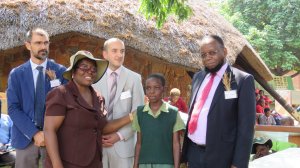
|
| Click here for more Eco Schools Challenge 2016 photos and videos | ||
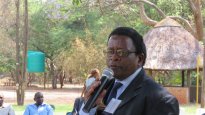 |
 |
 |
 |
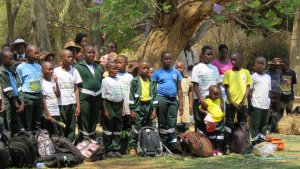 |
| To Find out more about the Eco Schools Programme, and get involved, contact: allainc@zol.co.zw; +263 242 747111 / 242 747123 / +263 774 198 009 |
||||
| Massive turn out for Mukuvisi Eco Schools 2016 World Environment Day Celebration on 10 June
Mukuvisi Woodlands Eco Schools Programme commemorated World Environment Day which falls on 5 June annually, on Friday 10 June. The Eco Schools Programme holds such events on Fridays, by mutual consensus amongst member school and colleges. This is the most practical day on which to bring several hundred children, teenagers and young adult students to spend the morning at the Mukuvisi Woodlands (or sometimes other venue) to celebrate the several special globally marked commemorative days which highlight issues of importance and concern in the areas of wildlife, conservation and environment generally. Friday's event was superb in every way. Attendance was huge, with 800 children and 200 adults turning out! The theme was 'Join the Race to Make the Future World we Want' and the event was generously supported by UNICEP and the UNDP, with additional assistance from the EU, Econet, Bird Life Zimbabwe, the Nyarado Group, World Vision and Total Zimbabwe, and was organised in collaboration with Ministry of Primary and Secondary Education and the Ministry of Environment, Water and Climate. There were lots of really interesting stands to visit, and many children recited poems and essays, performed plays and sang songs, around the environmental theme, to entertain and educate the crowd. |
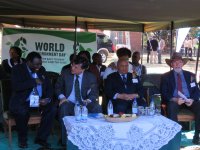 |
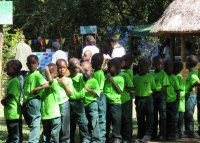 |
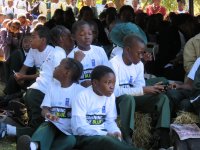 |
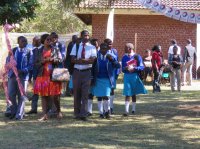 |
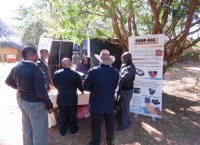 |
 |
||||
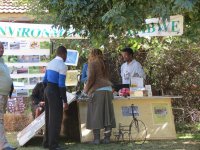 |
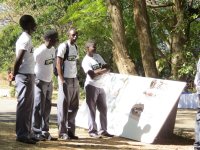 |
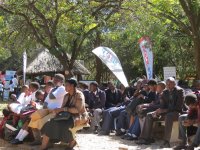 |
 |
 |
| Click HERE for more photos via our Facebook page....
And Click HERE for many more additional photos and videos of this event |
||||
| Mukuvisi Woodlands Eco Schools Challenge 2015 a tremendous success
Follow this link to many photos of this event Over 500 school children, university students, teachers, Mukuvisi Woodlands Councillors and staff and high level VIPs, turned out in force for the 2015 Mukuvisi Woodlands Eco Schools Challenge on 14 October. With the theme ‘A Healthy Environment – the Future we Want – Act NOW for Climate Justice’, this all-day event was a tremendous success on every level, and was made financially possible through the generous assistance of the European Union. Unicef provided additional sponsorship, while the French Embassy generously funded the production of 5000 booklets on Climate Change, a copy of which each participating child received, with additional copies being disturbed via the Eco Schools Programme in the year ahead. Each child at the event also received a T shirt and special branded bag. Over 40 schools participated in the event which wrapped up a very busy, active year in the Eco Schools Programme which is run by the Mukuvisi Woodlands Environmental Education Centre, headed by Co-Ordinator Gibson Nhokwara, who organised the event, spoke at the prize-giving and made an excellent Master of Ceremonies throughout. Other Mukuvisi Woodlands speakers at prize-giving were Chairman Simon Pitt and Vice Chairman Allain Chimanikire. The Eco Schools Programme was launched by Mukuvisi Woodlands Association around six years ago, following a model that is used successfully across the globe. It is a flagship of excellent hands-on experiential environmental education in Zimbabwe. The afternoon prize-giving celebrations were graced by the presence of their Excellencies the Ambassador of Portugal Dr Ricardo Pracana, the Ambassador of France Mr Laurent Delahousse, the Head of the EU Delegation to Zimbabwe, Phillippe van Damme, the Acting Head of the Food and Agricultural Organisation (FAO) in Zimbabwe Mr Martin Ager, a representative from the Dutch Embassy, and several other high ranking French Embassy, EU and UNDP officials and Unicef representatives. The Ministries of Education, Energy and Power Development and Environment, Water and Climate were well represented at the event, along with several tertiary education institutions. The Guest of Honour was Professor Paul Mavhima the Deputy Minister of Primary and Secondary Education who gave an upbeat speech at the prize-giving, extolling the Eco Schools Programme for their great strides and positive impact on environmental education in Zimbabwe. EU Head Mr Phillippe van Damme also delivered an excellent speech which focussed on the challenge of climate change and the need to ensure that today’s adults and the up-coming generations as represented by the school children there present had a tremendous burden to tackle this head on, and now, for their own sake and for generations to come. During the morning, the children were kept extremely active and busy, participating in the Primary and Secondary Eco Schools Quizzes, and exploring the Woodlands in search of clues to answer environmental quiz questions. It was a blazing hot day, and most children carried out this Treasure Hunt primarily at a run, so all were well hot and tired by lunchtime! This hunt for clues included a fun interlude navigating a Maze while being timed, constructed by the Mukuvisi Woodlands team. On display at the event were the amazing artworks and models entered into the Eco Schools Challenge by the children, inspired by the event’s guiding theme. The quality of these works was very impressive and the VIPS clearly enjoyed seeing what the children had produced which well demonstrated their full understanding of the devastating impacts of climate change to our futures if we do not act now, and many other burning environmental issues of our day. This art competition, plus the hunt for clues and answering of questions in the Woodlands themselves, the sit-down quiz and the school’s performance as an Eco School during the course of this year, plus its environmental networking activities, were all assessed and marked and informed the final decisions as to which were the overall Most Sustainable Schools in terms of the Programme and its guiding principles. The winning Primary School was Highlands and Secondary School was Chinhoyi High and prizes, funded by the EU, included solar power kits for the winning schools. Various other prizes were awarded for the different elements that made up the Challenge and the event ended on a very festive note. Also unveiled at the event was the winning logo design for the upcoming COP21 (communities of practice) event in Paris next month, at which 195 countries will be represented, to discuss and agree upon the United Nations Framework on Climate Change. The winning logo was designed by Tawanda Mhlanga of Chinhoyi University, who attended the event and received his award, delightedly shaking hands with the VIPs present. |
| 2015 Mukuvisi Woodlands Eco Challenge Prize Winners | |||||
| Place | Primary School | Secondary School | Place | Primary School | Secondary School |
| The Eco Challenge Quiz | The Art Competition | The Model Competition | |||
| 1 | Twin Lakes Primary | Highfield 1 High | 1 | Chiremba Primary | Chinhoyi High School |
| 2 | Chivhu Primary | Mandedza High School | 2 | The French School Harare | ZRP High |
| 3 | Highlands Primary | Visitation Makumbi | 3 | Ardbennie Primary | Zengeza 1 High |
| The Treasure Hunt | The Overall Most Sustainable Schools | ||||
| 1 | Twin Lakes Primary | Highfield 1 High | 1 | Highlands Primary | Chinhoyi High School |
| 2 | Chivhu Primary | Mufakose 2 High | 2 | Chiremba Primary | Highfield 1 High |
| 3 | Ardbennie Primary | Lord Malvern Secondary | 3 | Chivhu Primary | ZRP High |